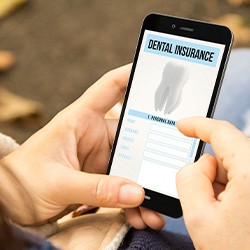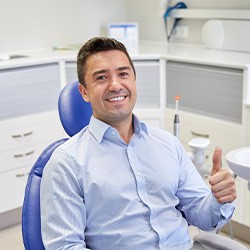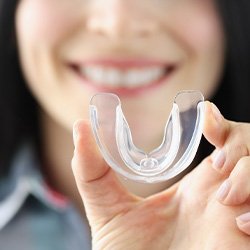Emergency Dentist – Cary, NC
Urgent Help When Your Smile Needs It Most
Dental emergencies are often sudden and scary. If you or a loved one is experiencing a severe injury or considerable pain, stay calm and don’t hesitate to contact our emergency dentist in Cary. Dr. Darren Koch and his skilled team provide helpful information and support over the phone and, when possible, we see dental emergency cases the same day so that patients get the relief they need quickly. With nearly 20 years of experience, state-of-the-art equipment, and a gentle touch, you can rest assured that you'll get outstanding care. If you're ever in need of a nearby emergency dentist, contact us anytime.
Why Choose Darren G. Koch, DDS, PA for Emergency Dentistry?
- Same-Day Dental Appointments Available
- State-of-the-Art Dental Technology
- High Emphasis on Patient Comfort
How We Treat Dental Emergencies
A dental emergency is no time for hesitation. When you call with an urgent dental problem, we’ll make time to see you right away so that you aren’t left dealing with the pain on your own any longer than you need to. While every emergency is different, there are generally four main stages to treatment:
- Same-day appointment: When you call us with a dental problem that requires an immediate attention, we’ll arrange to have you seen as soon as possible. Our team will give you some tips for performing first aid so that you can protect your smile until we can see you.
- Emergency exam: The first step once you get to our dental office is to determine the source and extent of the problem. X-rays will be taken as necessary. If you’re in immediate, severe pain, we’ll take whatever steps are needed to help you stay comfortable.
- Review findings: We’ll discuss the results of our examination, then recommend treatments designed to address the issue. You will always be given an estimate and timeline to consider before you agree to any treatment.
- Get the care you need: After you’ve agreed to a treatment, our team will work to restore your oral health and your smile as quickly as possible.
The Most Common Dental Emergencies
There are two main types of dental emergencies, both of which Dr. Koch can treat: ongoing dental problems such as a toothache that suddenly become painful and unexpected accidents and injuries. In either case, your first step is to call our office to schedule an appointment. In the meantime, you can use the following first-aid tips for immediate relief.
Understanding the Cost of Emergency Dentistry

Dental emergencies are already stressful enough without having to deal with uncertainties about the cost of treatment. Our team will aim to provide you with an accurate estimate of how much you can expect to pay for care once we have determined the kind of treatment that your smile needs. Not only will we be transparent about the price, but we’ll also walk you through your options for payment and explain what steps you can take to make your care as affordable as possible.
Every Dental Emergency is Different

“Dental emergency” is a broad category that includes all kinds of oral health issues. As such, the kind of treatment you require can vary based on the nature of your emergency. Consequently, there’s no way to know how much your emergency dental care will cost until you schedule an appointment at our office.
Once we’ve examined your mouth, we can figure out which dental services will help you regain your oral health. This can be as simple as placing a filling in some cases, but more severe emergencies will likely call for more advanced procedures. Whenever we suggest a treatment, we will make sure that you have a firm idea of what the cost will look like.
Does Dental Insurance Cover Dental Emergencies?

Yes, you can usually expect your dental insurance plan to help cover many of the procedures associated with emergency dental care. Coverage can vary depending on who your insurance carrier is, but many plans will pay 80% of the cost of minor restorative procedures and 50% of the cost of major ones. Be sure to double-check your dental insurance plan in order to make sure that you understand your coverage. If you have any questions, our team is happy to help.
Other Options for Making Dental Emergencies Affordable

Patients who don’t have dental insurance may be interested in signing up for our in-house membership plan. In exchange for a monthly or annual fee, you can get a discount on many different dental services. On top of that, we can also help you apply for CareCredit financing. CareCredit lets you choose a payment plan that’s right for your budget, essentially breaking up the cost of your care into installments that are much easier to manage.
Taking Care of Your Smile Can Save You Money

If you’re worried about the impact that a dental emergency could have on your financial situation, it’s best to do everything you can to make sure your smile stays in good health. Be sure to practice good oral hygiene every day, and don’t forget to visit our office twice a year so that we can give your smile a thorough cleaning and check for problems.
As soon as you notice any symptoms that could point to an issue with your oral health, let us know right away. Leaving the problem alone for too long could potentially make it worse and lead to needing more expensive care.
Keys to Preventing Dental Emergencies

While it’s good to have a reliable home for emergency dental care, you can save yourself a lot of trouble by taking steps to lower the chances of dental issues occurring in the first place. Luckily, doing so can be as easy as making a few small changes to your lifestyle. If you read on, you’ll find some key tips from our team that can go a long way toward protecting your smile from undesirable complications.
Visit Your Dentist Regularly

When it comes to preventing dental problems, one of the most important steps you can take is to schedule regular visits with your dentist. It’s more likely that gum disease and cavities will be caught early on if you have a dental professional take a close look at your smile. Furthermore, professional cleanings provide a reliable way to get rid of plaque and tartar on your teeth. You should plan on seeing the dentist twice a year at minimum.
Maintain Good Oral Hygiene at Home

Brushing your teeth twice a day is one of the most basic things you can do to lower your risk for cavities and other oral health issues. Remember, you don’t want to use just any toothbrush for the job; you should make sure that it has soft bristles that aren’t too abrasive on your enamel. A good oral hygiene routine will also include flossing, and you can rinse with mouthwash to help keep the harmful bacteria in your mouth under control.
Stick to a Nutritious Diet

Does your diet contain a lot of sugary and starchy foods? If so, you’ll definitely want to make a few adjustments for the sake of your oral health. Overindulging in sugar and starch can ultimately lead to cavities. Conversely, eating more fruits, vegetables, dairy products, nuts, and fatty fish can be very beneficial for your smile in the long run.
Wear a Mouthguard

While you can’t always predict when you’ll get hit in the mouth or jaw, there’s definitely an increased chance of it happening while you’re playing sports. In order to lower your risk of knocked-out or injured teeth, you should make a point of wearing an athletic mouthguard. Don’t forget that personalized mouthguards provided by a dental professional tend to offer better protection and comfort than store-bought mouthguards.
It may also help to invest in a nightguard to wear while you’re asleep. The benefit of a nightguard is that it protects your teeth from harmful grinding and clenching.
Use Tools to Open Packages, Not Your Teeth

When you’re struggling to open a package, you may want to use your teeth to speed things up. But while this may seem like a time-saver in the present, it could end up weakening or even damaging your teeth. The safest option is to look for an actual tool that can help you get the package open, such as a knife or a pair of scissors.
Dental Emergency FAQs
We sincerely hope that you never experience a dental emergency. But, despite our best efforts at preventing them, emergencies still happen. However, rest assured that Dr. Koch and our team have a caring chairside manner and many years of experience handling every type of emergency situation. You can bet that we'll get you out of pain quickly and protect your smile at the same time. Keep reading for answers to several common FAQs and don't hesitate to contact us if you're ever faced with a dental emergency in Cary. We're always just a phone call away!
How do I know if I’m having a dental emergency?
If you're in pain, it may be hard to know if you're having a true emergency or not. Here are several signs that you should seek immediate care:
- You're in pain and can't comfortably sleep, eat, or go to work
- You have a cut that's caused moderate to heavy bleeding
- You've knocked out a tooth
- You notice facial swelling or a pimple-like bump on your gums (this often indicates an infection that needs to be addressed as soon as possible)
- You've broken a tooth or filling
How do I remove an object that’s stuck between my teeth?
First, rinse your mouth out vigorously with water, as sometimes that alone can dislodge a stuck object. From there, take a piece of waxed dental floss and use firm but gentle pressure to work it between your teeth. If you have a floss threader, that may be helpful to position the floss below the object and loosen it from underneath.
Avoid the temptation to use anything sharp or pointed! That can do more harm than good and may result in an oral cut or laceration. If all else fails, give us a call to schedule a visit so Dr. Koch can take a look.
How long will my toothache last?
Generally speaking, a toothache will last indefinitely until you address the source of the pain. In some cases, it may be sensitivity from gum recession that's exposed the sensitive root surfaces of your teeth. In this situation, sensitivity toothpaste or extra topical fluoride may take care of it.
But if you have a cavity, even a small one, you'll feel more pronounced cold, hot or pressure sensitivity (or the tooth may hurt on its own). Without treatment, these types of toothaches will only get worse with time and lead to more pain and damage to your tooth.
If you have any type of toothache, give us a call right away to schedule an appointment. After Dr. Koch has examined your teeth, he can pinpoint the cause of the problem and proceed from there.
What should I do about a chipped tooth?
Begin by rinsing with lukewarm water. If you only have a minor chip, it will probably be fairly painless. But, if necessary, you can cover a sharp edge with dental wax from the store until you can come in to have it looked at. If you have a more severe chip that's causing discomfort, take over-the-counter pain medication such as Ibuprofen. Give us a call right away to schedule an appointment and avoid hard or crunchy foods and extreme temperatures until your visit.
After doing an exam, Dr. Koch will recommend the best treatment for you, depending on the severity of your chipped tooth. That could be smoothing the edge of the tooth, repairing it with a tooth-colored filling, or using a veneer or dental crown to replace missing tooth structure.






